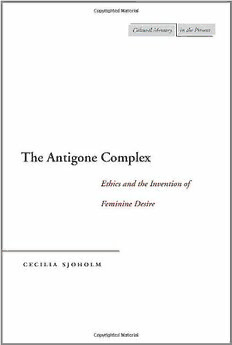
The Antigone complex : ethics and the invention of feminine desire PDF
Preview The Antigone complex : ethics and the invention of feminine desire
(cid:1) ultural Memory in the (cid:2) resent Mieke Bal and Hent de Vries, Editors THE ANTIGONE COMPLEX Ethics and the Invention of Feminine Desire Cecilia Sjöholm , Stanford University Press Stanford, California © by the Board of Trustees of the Leland Stanford Junior University. All rights reserved. No part of this book may be reproduced or transmitted in any form or by any means, electronic or mechanical, including photocopying and recording, or in any information storage or retrieval system without the prior written permission of Stanford University Press. Printed in the United States of America on acid-free, archival-quality paper Library of Congress Cataloging-in-Publication Data Sjöholm, Cecilia. The Antigone complex : ethics and the invention of feminine desire / Cecilia Sjöholm. p. cm.—(Cultural memory in the present) Includes bibliographical references and index. ---(alk. paper) . Feminist ethics. . Desire (Philosophy) . Femininity (Philosophy) . Antigone (Greek mythology) I. Title. II. Series. . ’.—dc Original Printing Last figure below indicates year of this printing: Contents Acknowledgments ix Introduction xi Morality and the Invention of Feminine Desire Sexuality Versus Recognition: Feminine Desire in the Ethical Order The Purest Poem...: Heidegger’s Antigone From Oedipus to Antigone: Revisiting the Question of Feminine Desire Family Politics/Family Ethics: Butler, Lacan, and the Thing beyond the Object Notes Bibliography Index Acknowledgments Many people have participated in the intellectual work leading to the completion of this book. I do not have space to list them all, but where names would be too abundant, I would at least like to point to the con- texts and places that have served as an inspiration. First of all I would like to thank the institutions that have generously contributed research fund- ing: FRN or the Swedish Research Council, the Swedish Institute, and the Knut and Alice Wallenberg Foundation. The Center for Theoretical Stud- ies at Essex University, where I have spent a lot of time as a visiting fellow throughout my writing of this project, proved an extraordinarily fruitful place to pursue research of this kind. I am particularly grateful to Noreen Harburt for having lent me her office. The Philosophy Department at De- Paul University had the kindness to invite me as a visiting professor in –. The graduate course on Lacan that I gave there, and the response by the graduate students who attended, was crucial to the development of the project. The response from audiences to whom I have had the chance to present this material has been of great importance: the University of Essex, University of Memphis, University of Michigan, Middlesex University, the New School of Social Research, Université de Louvaine, Katholieke Uni- versiteit Nijmegen, University of Gothenburg, University of Stockholm, South Stockholm University College, and the Université de Toulouse. I would particularly like to thank those who invited me to present the ma- terial: Sara Beardsworth, Peg Birmingham, Fabienne Bruguère, Eva-Lena Dahl, Bernard Flynn, Philippe van Haute, Peter Osborne, Renata Salecl, Stella Sandford, and Slavoj Zˇizˇek. Moreover, I would like to thank the col- leagues who invited me to publish work in progress in reviews such as Agora, Ny Poetik, New Formations,and Radical Philosophy. Parts of the ma- terial appeared, at an early stage of elaboration, as a long article in Swedish in Tingets Imperium(Natur and Kultur, ). The invitations to publish x Acknowledgments made this into a better book as did the comments on the texts made by In- geborg Owesen, Lis Möller, Chris Bremers, Monique David-Ménard, Paul Moyaert, Veronica Vasterling, Ben Vedder, Stella Sandford and Peter Os- borne, Renata Salecl, Christian Nilsson, Hent de Vries, and Paola Marrati. The editors at Stanford University Press—Norris Pope, Tim Roberts, and Elizabeth Berg—offered crucial help in the final stages toward the re- alization of this book. Rachel Åkerstedt helped me with the proofreading. Finally, I am particularly indebted to those who read and discussed this manuscript simply as friends and colleagues, many of whom are already mentioned above, but also Karen de Boer, Tina Chanter, Carl-Michael Edenborg, Claudia Linden, Hans Ruin, Rudi Visker, and Ewa Ziarek. My gratitude to Philippe van Haute must be singled out, since he encouraged me to present this manuscript as a doctoral thesis at the department of phi- losophy at the University of Nijuugen. And all along, since the very incep- tion of this project, Simon Critchley has been engaged in it, offering fun, love, and support.
